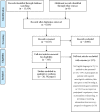Experiences and views of receiving and delivering information about recovery in acquired neurological conditions: a systematic review of qualitative literature
- PMID: 33906841
- PMCID: PMC8088240
- DOI: 10.1136/bmjopen-2020-045297
Experiences and views of receiving and delivering information about recovery in acquired neurological conditions: a systematic review of qualitative literature
Abstract
Objective: To review and synthesise qualitative literature relating to the views, perceptions and experiences of patients with acquired neurological conditions and their caregivers about the process of receiving information about recovery; as well as the views and experiences of healthcare professionals involved in delivering this information.
Design: Systematic review of qualitative studies.
Data sources: MEDLINE, Embase, AMED, CINAHL, PsycINFO, Web of Science and the Cochrane library were searched from their inception to July 2019.
Data extraction and synthesis: Two reviewers extracted data from the included studies and assessed quality using an established tool. Thematic synthesis was used to synthesise the findings of included studies.
Results: Searches yielded 9105 titles, with 145 retained for full-text screening. Twenty-eight studies (30 papers) from eight countries were included. Inductive analysis resulted in 11 descriptive themes, from which 5 analytical themes were generated: the right information at the right time; managing expectations; it's not what you say, it's how you say it; learning how to talk about recovery and manage emotions; the context of uncertainty.
Conclusions: Our findings highlight the inherent challenges in talking about recovery in an emotional context, where breaking bad news is a key feature. Future interventions should focus on preparing staff to meet patients' and families' information needs, as well as ensuring they have the skills to discuss potential recovery and break bad news compassionately and share the uncertain trajectory characteristic of acquired neurological conditions. An agreed team-based approach to talking about recovery is recommended to ensure consistency and improve the experiences of patients and their families.
Keywords: adult neurology; neurological injury; rehabilitation medicine.
© Author(s) (or their employer(s)) 2021. Re-use permitted under CC BY-NC. No commercial re-use. See rights and permissions. Published by BMJ.
Conflict of interest statement
Competing interests: None declared.
Figures
References
-
- The Neurological Alliance . Neuro numbers, 2019. Available: https://www.neural.org.uk/assets/pdfs/neuro-numbers-2019.pdf
-
- Intercollegiate Stroke Working Party . National clinical guideline for stroke. 5th edition. London: Royal College of Physicians, 2016.
Publication types
MeSH terms
LinkOut - more resources
Full Text Sources
Medical
Research Materials


